A Study of Power, Ambition, and Gender in Shakespeare's Lady Macbeth
VerifiedAdded on 2023/04/21
|5
|1218
|299
Essay
AI Summary
This essay provides an analysis of Lady Macbeth's character in Shakespeare's play, Macbeth. It examines her portrayal as a powerful and ambitious figure who is initially driven by a desire for her husband to become king. The essay explores her manipulation of Macbeth, her association with supernatural forces, and her role in the planning and execution of King Duncan's murder. It delves into the themes of power, ambition, gender roles, and the consequences of unchecked ambition, highlighting Lady Macbeth's transformation from a seemingly strong and ruthless woman to a vulnerable figure consumed by guilt and eventually driven to suicide. The essay contrasts her with the societal expectations of women during her time and analyzes her shift from a dominant role to a position of weakness as the play progresses. The conclusion underscores Lady Macbeth's manipulative nature and her significant influence on the tragic events of the play.
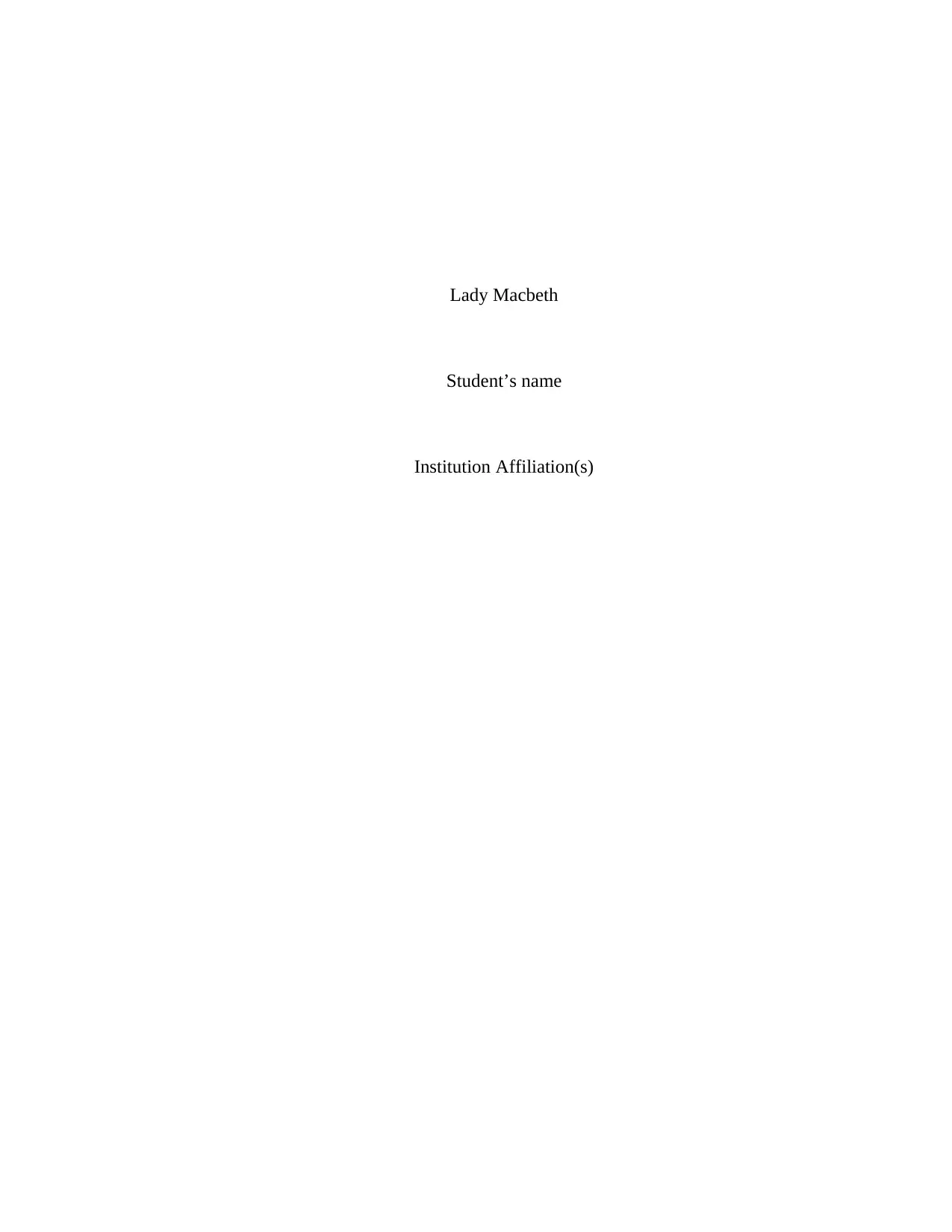
Lady Macbeth
Student’s name
Institution Affiliation(s)
Student’s name
Institution Affiliation(s)
Paraphrase This Document
Need a fresh take? Get an instant paraphrase of this document with our AI Paraphraser
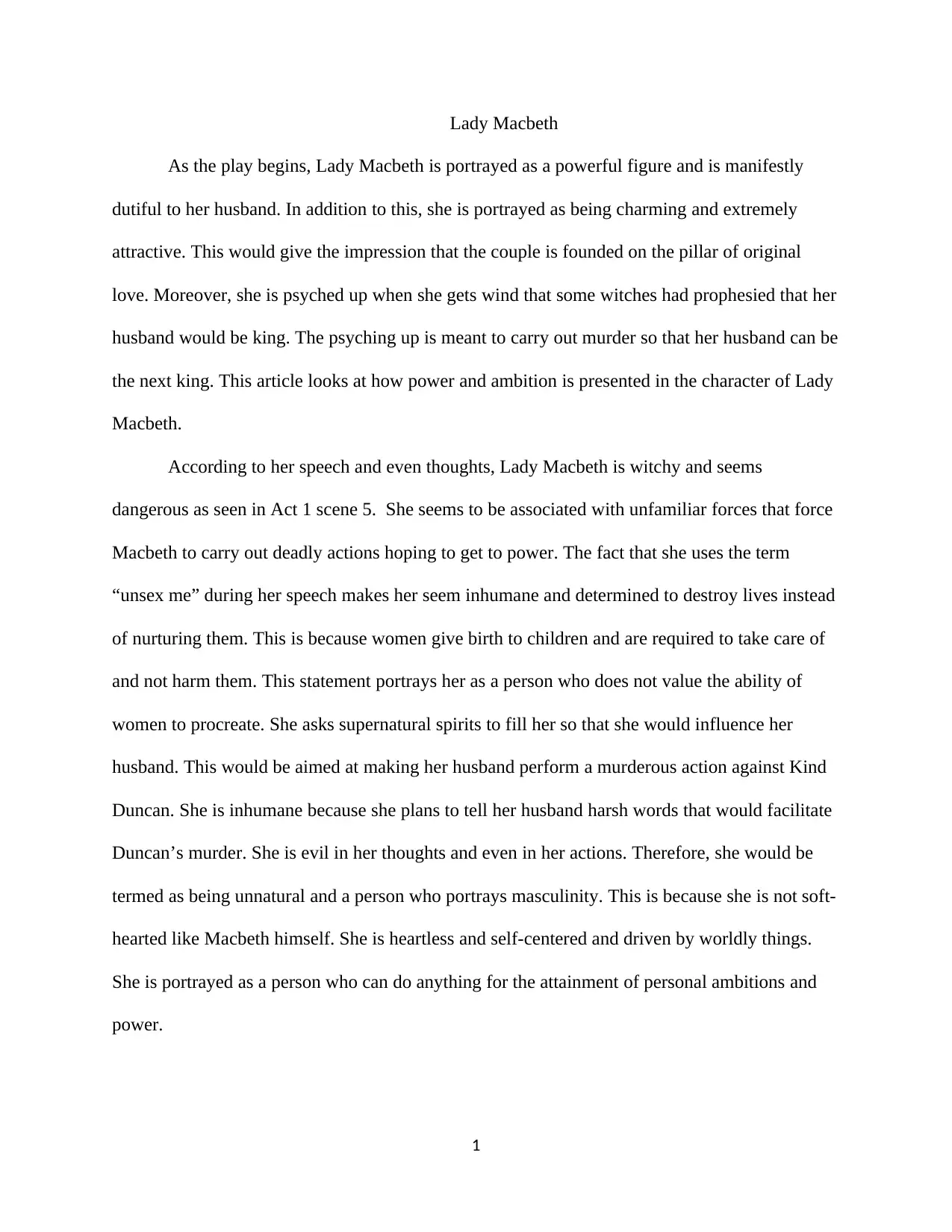
Lady Macbeth
As the play begins, Lady Macbeth is portrayed as a powerful figure and is manifestly
dutiful to her husband. In addition to this, she is portrayed as being charming and extremely
attractive. This would give the impression that the couple is founded on the pillar of original
love. Moreover, she is psyched up when she gets wind that some witches had prophesied that her
husband would be king. The psyching up is meant to carry out murder so that her husband can be
the next king. This article looks at how power and ambition is presented in the character of Lady
Macbeth.
According to her speech and even thoughts, Lady Macbeth is witchy and seems
dangerous as seen in Act 1 scene 5. She seems to be associated with unfamiliar forces that force
Macbeth to carry out deadly actions hoping to get to power. The fact that she uses the term
“unsex me” during her speech makes her seem inhumane and determined to destroy lives instead
of nurturing them. This is because women give birth to children and are required to take care of
and not harm them. This statement portrays her as a person who does not value the ability of
women to procreate. She asks supernatural spirits to fill her so that she would influence her
husband. This would be aimed at making her husband perform a murderous action against Kind
Duncan. She is inhumane because she plans to tell her husband harsh words that would facilitate
Duncan’s murder. She is evil in her thoughts and even in her actions. Therefore, she would be
termed as being unnatural and a person who portrays masculinity. This is because she is not soft-
hearted like Macbeth himself. She is heartless and self-centered and driven by worldly things.
She is portrayed as a person who can do anything for the attainment of personal ambitions and
power.
1
As the play begins, Lady Macbeth is portrayed as a powerful figure and is manifestly
dutiful to her husband. In addition to this, she is portrayed as being charming and extremely
attractive. This would give the impression that the couple is founded on the pillar of original
love. Moreover, she is psyched up when she gets wind that some witches had prophesied that her
husband would be king. The psyching up is meant to carry out murder so that her husband can be
the next king. This article looks at how power and ambition is presented in the character of Lady
Macbeth.
According to her speech and even thoughts, Lady Macbeth is witchy and seems
dangerous as seen in Act 1 scene 5. She seems to be associated with unfamiliar forces that force
Macbeth to carry out deadly actions hoping to get to power. The fact that she uses the term
“unsex me” during her speech makes her seem inhumane and determined to destroy lives instead
of nurturing them. This is because women give birth to children and are required to take care of
and not harm them. This statement portrays her as a person who does not value the ability of
women to procreate. She asks supernatural spirits to fill her so that she would influence her
husband. This would be aimed at making her husband perform a murderous action against Kind
Duncan. She is inhumane because she plans to tell her husband harsh words that would facilitate
Duncan’s murder. She is evil in her thoughts and even in her actions. Therefore, she would be
termed as being unnatural and a person who portrays masculinity. This is because she is not soft-
hearted like Macbeth himself. She is heartless and self-centered and driven by worldly things.
She is portrayed as a person who can do anything for the attainment of personal ambitions and
power.
1
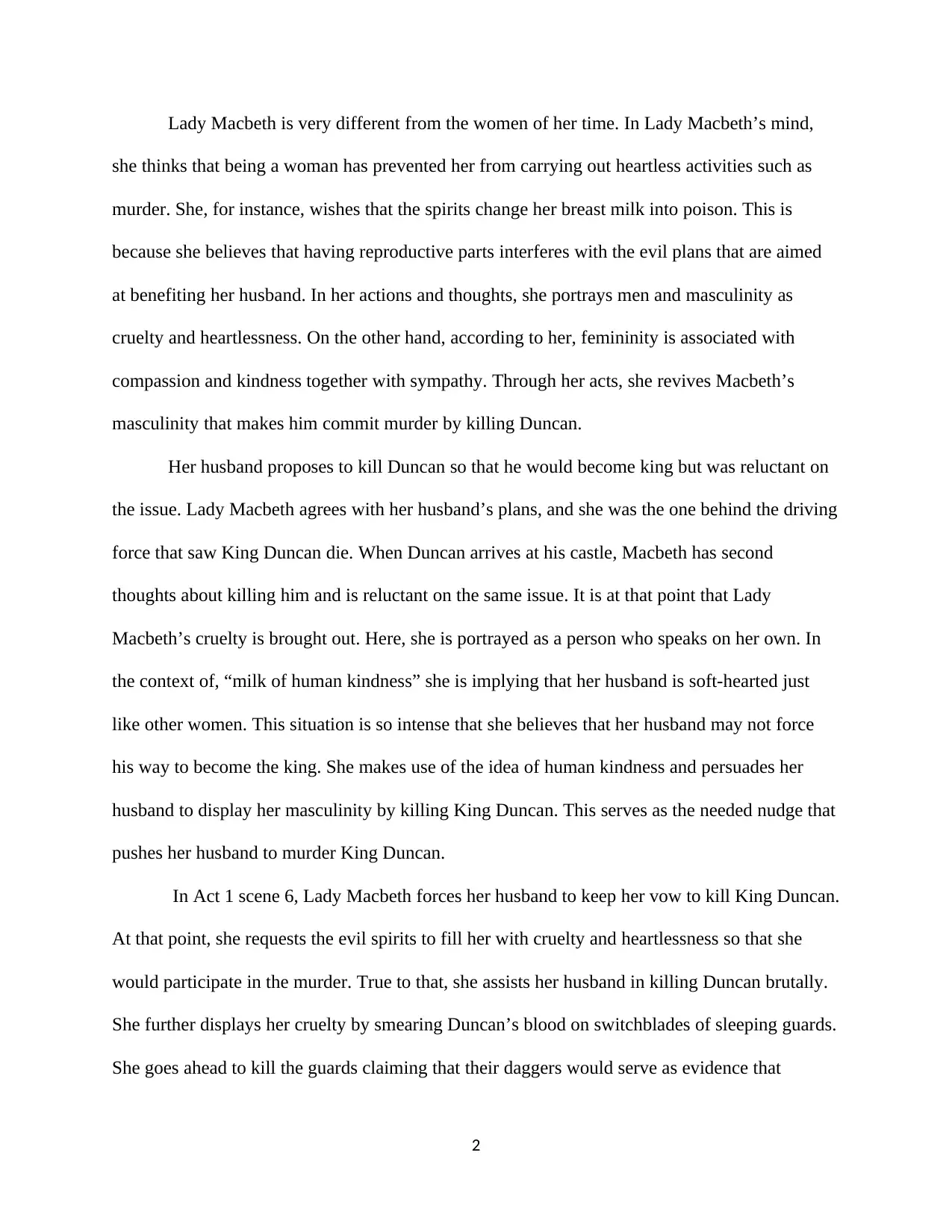
Lady Macbeth is very different from the women of her time. In Lady Macbeth’s mind,
she thinks that being a woman has prevented her from carrying out heartless activities such as
murder. She, for instance, wishes that the spirits change her breast milk into poison. This is
because she believes that having reproductive parts interferes with the evil plans that are aimed
at benefiting her husband. In her actions and thoughts, she portrays men and masculinity as
cruelty and heartlessness. On the other hand, according to her, femininity is associated with
compassion and kindness together with sympathy. Through her acts, she revives Macbeth’s
masculinity that makes him commit murder by killing Duncan.
Her husband proposes to kill Duncan so that he would become king but was reluctant on
the issue. Lady Macbeth agrees with her husband’s plans, and she was the one behind the driving
force that saw King Duncan die. When Duncan arrives at his castle, Macbeth has second
thoughts about killing him and is reluctant on the same issue. It is at that point that Lady
Macbeth’s cruelty is brought out. Here, she is portrayed as a person who speaks on her own. In
the context of, “milk of human kindness” she is implying that her husband is soft-hearted just
like other women. This situation is so intense that she believes that her husband may not force
his way to become the king. She makes use of the idea of human kindness and persuades her
husband to display her masculinity by killing King Duncan. This serves as the needed nudge that
pushes her husband to murder King Duncan.
In Act 1 scene 6, Lady Macbeth forces her husband to keep her vow to kill King Duncan.
At that point, she requests the evil spirits to fill her with cruelty and heartlessness so that she
would participate in the murder. True to that, she assists her husband in killing Duncan brutally.
She further displays her cruelty by smearing Duncan’s blood on switchblades of sleeping guards.
She goes ahead to kill the guards claiming that their daggers would serve as evidence that
2
she thinks that being a woman has prevented her from carrying out heartless activities such as
murder. She, for instance, wishes that the spirits change her breast milk into poison. This is
because she believes that having reproductive parts interferes with the evil plans that are aimed
at benefiting her husband. In her actions and thoughts, she portrays men and masculinity as
cruelty and heartlessness. On the other hand, according to her, femininity is associated with
compassion and kindness together with sympathy. Through her acts, she revives Macbeth’s
masculinity that makes him commit murder by killing Duncan.
Her husband proposes to kill Duncan so that he would become king but was reluctant on
the issue. Lady Macbeth agrees with her husband’s plans, and she was the one behind the driving
force that saw King Duncan die. When Duncan arrives at his castle, Macbeth has second
thoughts about killing him and is reluctant on the same issue. It is at that point that Lady
Macbeth’s cruelty is brought out. Here, she is portrayed as a person who speaks on her own. In
the context of, “milk of human kindness” she is implying that her husband is soft-hearted just
like other women. This situation is so intense that she believes that her husband may not force
his way to become the king. She makes use of the idea of human kindness and persuades her
husband to display her masculinity by killing King Duncan. This serves as the needed nudge that
pushes her husband to murder King Duncan.
In Act 1 scene 6, Lady Macbeth forces her husband to keep her vow to kill King Duncan.
At that point, she requests the evil spirits to fill her with cruelty and heartlessness so that she
would participate in the murder. True to that, she assists her husband in killing Duncan brutally.
She further displays her cruelty by smearing Duncan’s blood on switchblades of sleeping guards.
She goes ahead to kill the guards claiming that their daggers would serve as evidence that
2
⊘ This is a preview!⊘
Do you want full access?
Subscribe today to unlock all pages.

Trusted by 1+ million students worldwide
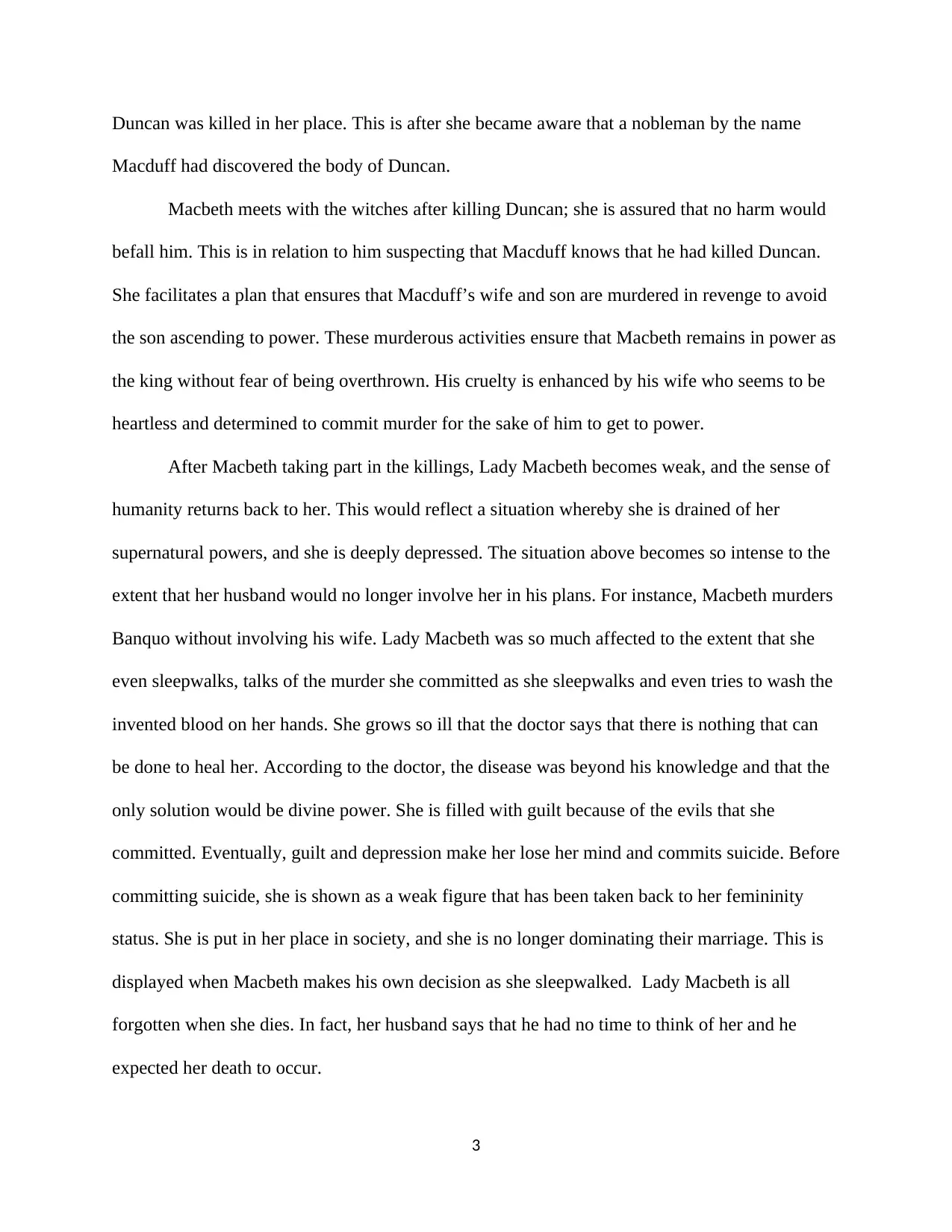
Duncan was killed in her place. This is after she became aware that a nobleman by the name
Macduff had discovered the body of Duncan.
Macbeth meets with the witches after killing Duncan; she is assured that no harm would
befall him. This is in relation to him suspecting that Macduff knows that he had killed Duncan.
She facilitates a plan that ensures that Macduff’s wife and son are murdered in revenge to avoid
the son ascending to power. These murderous activities ensure that Macbeth remains in power as
the king without fear of being overthrown. His cruelty is enhanced by his wife who seems to be
heartless and determined to commit murder for the sake of him to get to power.
After Macbeth taking part in the killings, Lady Macbeth becomes weak, and the sense of
humanity returns back to her. This would reflect a situation whereby she is drained of her
supernatural powers, and she is deeply depressed. The situation above becomes so intense to the
extent that her husband would no longer involve her in his plans. For instance, Macbeth murders
Banquo without involving his wife. Lady Macbeth was so much affected to the extent that she
even sleepwalks, talks of the murder she committed as she sleepwalks and even tries to wash the
invented blood on her hands. She grows so ill that the doctor says that there is nothing that can
be done to heal her. According to the doctor, the disease was beyond his knowledge and that the
only solution would be divine power. She is filled with guilt because of the evils that she
committed. Eventually, guilt and depression make her lose her mind and commits suicide. Before
committing suicide, she is shown as a weak figure that has been taken back to her femininity
status. She is put in her place in society, and she is no longer dominating their marriage. This is
displayed when Macbeth makes his own decision as she sleepwalked. Lady Macbeth is all
forgotten when she dies. In fact, her husband says that he had no time to think of her and he
expected her death to occur.
3
Macduff had discovered the body of Duncan.
Macbeth meets with the witches after killing Duncan; she is assured that no harm would
befall him. This is in relation to him suspecting that Macduff knows that he had killed Duncan.
She facilitates a plan that ensures that Macduff’s wife and son are murdered in revenge to avoid
the son ascending to power. These murderous activities ensure that Macbeth remains in power as
the king without fear of being overthrown. His cruelty is enhanced by his wife who seems to be
heartless and determined to commit murder for the sake of him to get to power.
After Macbeth taking part in the killings, Lady Macbeth becomes weak, and the sense of
humanity returns back to her. This would reflect a situation whereby she is drained of her
supernatural powers, and she is deeply depressed. The situation above becomes so intense to the
extent that her husband would no longer involve her in his plans. For instance, Macbeth murders
Banquo without involving his wife. Lady Macbeth was so much affected to the extent that she
even sleepwalks, talks of the murder she committed as she sleepwalks and even tries to wash the
invented blood on her hands. She grows so ill that the doctor says that there is nothing that can
be done to heal her. According to the doctor, the disease was beyond his knowledge and that the
only solution would be divine power. She is filled with guilt because of the evils that she
committed. Eventually, guilt and depression make her lose her mind and commits suicide. Before
committing suicide, she is shown as a weak figure that has been taken back to her femininity
status. She is put in her place in society, and she is no longer dominating their marriage. This is
displayed when Macbeth makes his own decision as she sleepwalked. Lady Macbeth is all
forgotten when she dies. In fact, her husband says that he had no time to think of her and he
expected her death to occur.
3
Paraphrase This Document
Need a fresh take? Get an instant paraphrase of this document with our AI Paraphraser
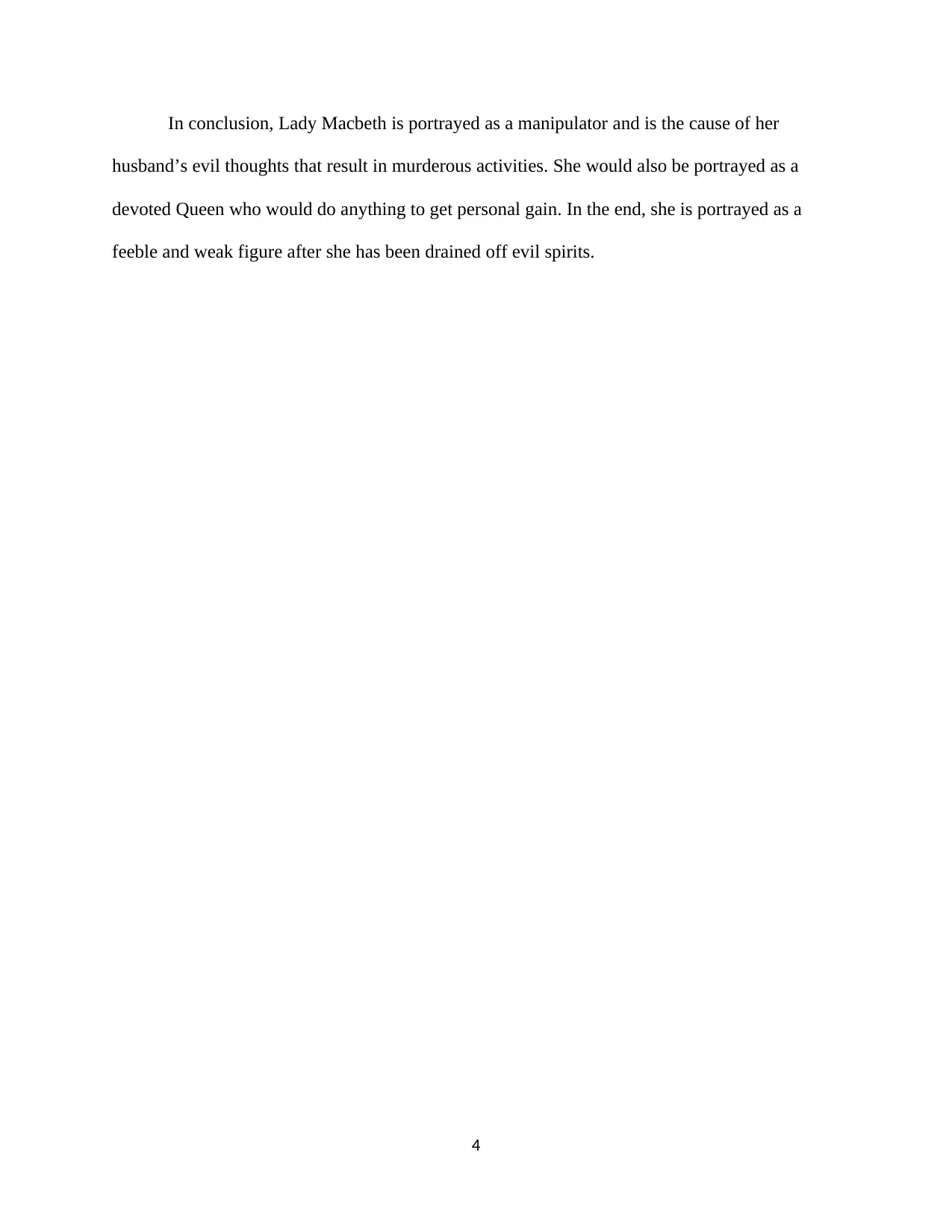
In conclusion, Lady Macbeth is portrayed as a manipulator and is the cause of her
husband’s evil thoughts that result in murderous activities. She would also be portrayed as a
devoted Queen who would do anything to get personal gain. In the end, she is portrayed as a
feeble and weak figure after she has been drained off evil spirits.
4
husband’s evil thoughts that result in murderous activities. She would also be portrayed as a
devoted Queen who would do anything to get personal gain. In the end, she is portrayed as a
feeble and weak figure after she has been drained off evil spirits.
4
1 out of 5
Related Documents
Your All-in-One AI-Powered Toolkit for Academic Success.
+13062052269
info@desklib.com
Available 24*7 on WhatsApp / Email
![[object Object]](/_next/static/media/star-bottom.7253800d.svg)
Unlock your academic potential
Copyright © 2020–2025 A2Z Services. All Rights Reserved. Developed and managed by ZUCOL.




